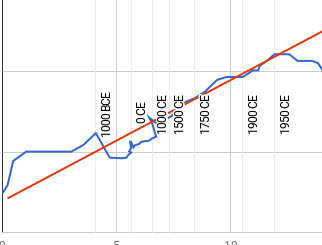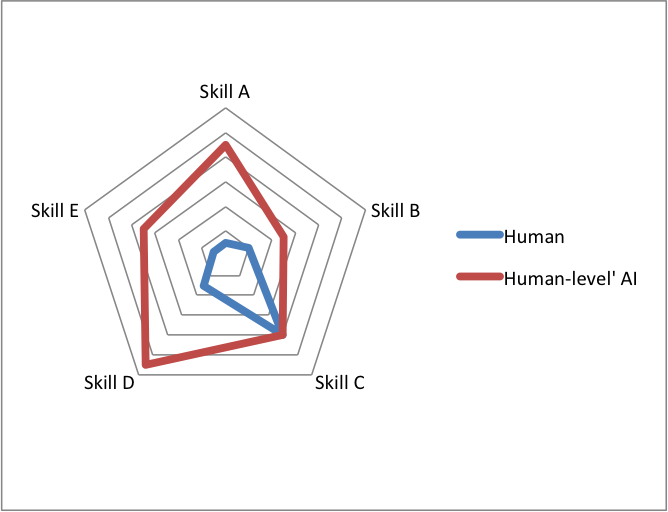Updated Nov 25, 2020
The wandering albatross:
- can fly around 240m/kJ
- and move mass at around 1.4—3.0kg.m/J
Details
The wandering albatross is a very large seabird that flies long distances on wings with the largest span of any bird.1
Distance per Joule
Speed
In a study of wandering albatrosses flying in various wind speeds and directions, average ground speed was 12 m/s, though the fastest ground speed measured appears to be around 24m/s, 2 We use average ground speed for this estimate because we only have data on average energy expenditure, though it is likely that higher ground speeds involve more energy efficient flight, since albatross flight speed is dependent on wind and it appears that higher speeds are substantially due to favorable winds.3
Energy expenditure
One study produced an estimate that when flying, albatrosses use 2.35 times their basal metabolic rate4 which same paper implies is around 1,833 kJ/bird.day.5
That gives us a flight cost for flying of 0.050 kJ/second.6
Distance per Joule calculation
This gives us a distance per energy score of:
distance/energy
= 12 m/s / 0.050 kJ/s
= 240m/kJ
Mass.distance per Joule
Albatrosses weigh 5.9 to 12.7 kg.7
Thus we can estimate:
mass.distance/Joule
= 5.9kg * 240 m/kJ to 12.7kg*240 m/kJ
= 1.4—3.0kg.m/J
Primary author: Ronny Fernandez
Notes
- “The wandering albatross, snowy albatross, white-winged albatross or goonie[3] (Diomedea exulans) is a large seabird from the family Diomedeidae, which has a circumpolar range in the Southern Ocean…It is one of the largest, best known, and most studied species of bird in the world, with it possessing the greatest known wingspan of any living bird. …Some individual wandering albatrosses are known to circumnavigate the Southern Ocean three times, covering more than 120,000 km (75,000 mi), in one year”
“Wandering Albatross.” In Wikipedia, October 27, 2020. https://en.wikipedia.org/w/index.php?title=Wandering_albatross&oldid=985673754.
- “The average ground speed is 12.0 (± 0.1) m/s.”
See Figure 3 for all ground speed measurements. Though also,
“Notably, due to the combination of fast airspeeds and leeway the fastest ground speeds (~ 22 m/s) tend to be located in the diagonal downwind direction.Richardson, Philip L., Ewan D. Wakefield, and Richard A. Phillips. “Flight Speed and Performance of the Wandering Albatross with Respect to Wind.” Movement Ecology 6, no. 1 (March 7, 2018): 3. https://doi.org/10.1186/s40462-018-0121-9.
- “Notably, due to the combination of fast airspeeds and leeway the fastest ground speeds (~ 22 m/s) tend to be located in the diagonal downwind direction.”
Richardson, Philip L., Ewan D. Wakefield, and Richard A. Phillips. “Flight Speed and Performance of the Wandering Albatross with Respect to Wind.” Movement Ecology 6, no. 1 (March 7, 2018): 3. https://doi.org/10.1186/s40462-018-0121-9.
- “Energy cost of flight was estimated to be 2.35 times measured BMR.”
Adams, N. J., C. R. Brown, and K. A. Nagy. “Energy Expenditure of Free-Ranging Wandering Albatrosses Diomedea Exulans.” Physiological Zoology 59, no. 6 (November 1, 1986): 583–91. https://doi.org/10.1086/physzool.59.6.30158606.
- “This is equivalent to an overall energy expenditure of 3,354 kJ bird⁻¹ day⁻¹ or 1.83 times measured basal metabolic rate (BMR).”
Adams, N. J., C. R. Brown, and K. A. Nagy. “Energy Expenditure of Free-Ranging Wandering Albatrosses Diomedea Exulans.” Physiological Zoology 59, no. 6 (November 1, 1986): 583–91. https://doi.org/10.1086/physzool.59.6.30158606.
From this we infer that the basal metabolic rate is 1,833 kJ/ bird.day.
- 2.35 * 3,354 kJ/1.83 * 1/86400 seconds/day
- “Adults can weigh from 5.9 to 12.7 kg (13 to 28 lb)”
“Wandering Albatross.” In Wikipedia, October 27, 2020. https://en.wikipedia.org/w/index.php?title=Wandering_albatross&oldid=985673754.


